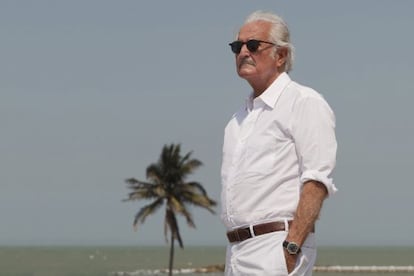Carlos Fuentes, writer, dies at 83
A life marked by personal tragedy and enthusiasm for literature ends in Mexico City


He had experienced anguish and sorrow. But he had never been sad in the morning. That passage by Hemingway is a good way to describe the life of Carlos Fuentes, the novelist who died today, on May 15, age 83 in Mexico, his country, although he was born in Panama.
He suffered the death of two of his children, and that double tragedy, which he overcame with the integrity of spirit he shared with his wife Sylvia Lemus, would become an enormously dramatic element in some of his later works. But his iron will, as sturdy as his health, allowed him to get over the impact of the shocking loss of his son Carlos and daughter Natasha.
He had the stamina of an athlete, but his heart bore the brunt of those blows until today it could take no more. His physical strength, which was also his literary force, was beaten down by the age of time, that metaphor to which he devoted his efforts as a writer and also as a civic response to a century in the history of Mexico and of all humanity.
This week he was still to be found in Argentina, visiting the book fair in Buenos Aires. There he announced new projects; he explained to EL PA?S correspondent Francisco Peregil that as long as he had plans on the go (and he had stacks), he would never surrender his life to the melancholy of death. That was his motto; that is why his public actions were never interrupted by personal injuries. The fight against time was his discipline.
His public actions were never interrupted by personal injuries
He would wake at dawn to set down on paper the writing that his notes from previous days suggested to him; and he would write like a man possessed through the night until daybreak. Then he would go for a walk (he had dropped running), and after midday he was ready to socialize. Toward the end of his life he kept himself mostly shut away (in London, New York, Mexico or on his excursions into the wider world), but he still left a window open here and there so as not to forget the other side of his persona. He met with politicos, economists, and writers, among others, and he listened intently; he wanted to take stock of the goings-on in the world, the results of which he poured into articles in which we can read a gradual sense of disappointment in the human condition.
Last November he sat down for hours with the former Chilean president, Ricardo Lagos. Both wished to know more about the other; their opinions and what they thought the future held in store. Fuentes was not at that time in the best of spirits; his literary passion collided with his civic calling at the start of that dialogue, and it was difficult to draw the words out of him, as if Fuentes had closed in on himself and was beyond the universe of mere possibilities. But suddenly the Chilean former leader brought up the topic of literature and Fuentes was revivified; that was his realm. Perturbed by his country, perturbed by the world, and perturbed by the personal universe which had once encouraged him, Fuentes was now only a writer, a mind in search of fictions which would explain this world.
He was a globetrotter. One of his last experiences with other writers was to be in Aix-en-Provence, where a formidable group of authors (French, Spanish and Mexicans included) came together to pay him homage with a symposium on his literature. At 9am, dressed in one of those impeccably ironed white shirts with which he enhanced his figure, he appeared before the youngsters who wanted to ask him questions. He was seated; Fuentes had never sat down, but now he did so. He signed books standing up, talked standing up, dispatched lectures as if he was running a marathon, but now Fuentes did not have the strength of before. In Buenos Aires he said that time would not defeat him. On his way to the hospital in Mexico City, this athlete of enthusiasm felt that his hold on life was not corresponded in the way it always had been even in the darkest times. And what is left of him, of that enthusiasm, is a powerful oeuvre which he wrote by hand until the finger with which he held his pencil developed a curve. Sometimes he would hold it up: ¡°Here is my ally.¡± His heart ducked out on him on the most sorrowful morning of all the mornings he wanted to be happy.
Tu suscripci¨®n se est¨¢ usando en otro dispositivo
?Quieres a?adir otro usuario a tu suscripci¨®n?
Si contin¨²as leyendo en este dispositivo, no se podr¨¢ leer en el otro.
FlechaTu suscripci¨®n se est¨¢ usando en otro dispositivo y solo puedes acceder a EL PA?S desde un dispositivo a la vez.
Si quieres compartir tu cuenta, cambia tu suscripci¨®n a la modalidad Premium, as¨ª podr¨¢s a?adir otro usuario. Cada uno acceder¨¢ con su propia cuenta de email, lo que os permitir¨¢ personalizar vuestra experiencia en EL PA?S.
En el caso de no saber qui¨¦n est¨¢ usando tu cuenta, te recomendamos cambiar tu contrase?a aqu¨ª.
Si decides continuar compartiendo tu cuenta, este mensaje se mostrar¨¢ en tu dispositivo y en el de la otra persona que est¨¢ usando tu cuenta de forma indefinida, afectando a tu experiencia de lectura. Puedes consultar aqu¨ª los t¨¦rminos y condiciones de la suscripci¨®n digital.








































